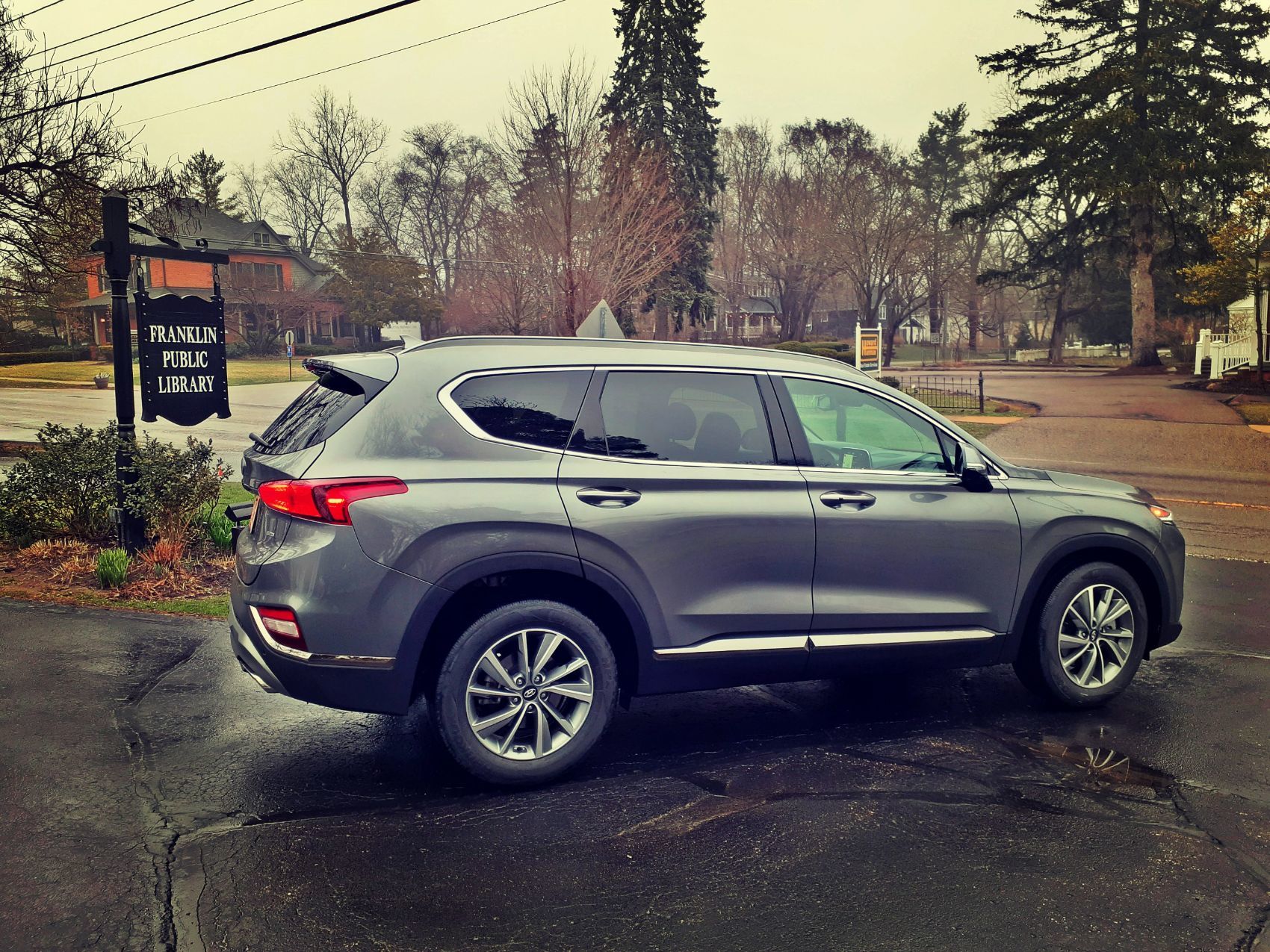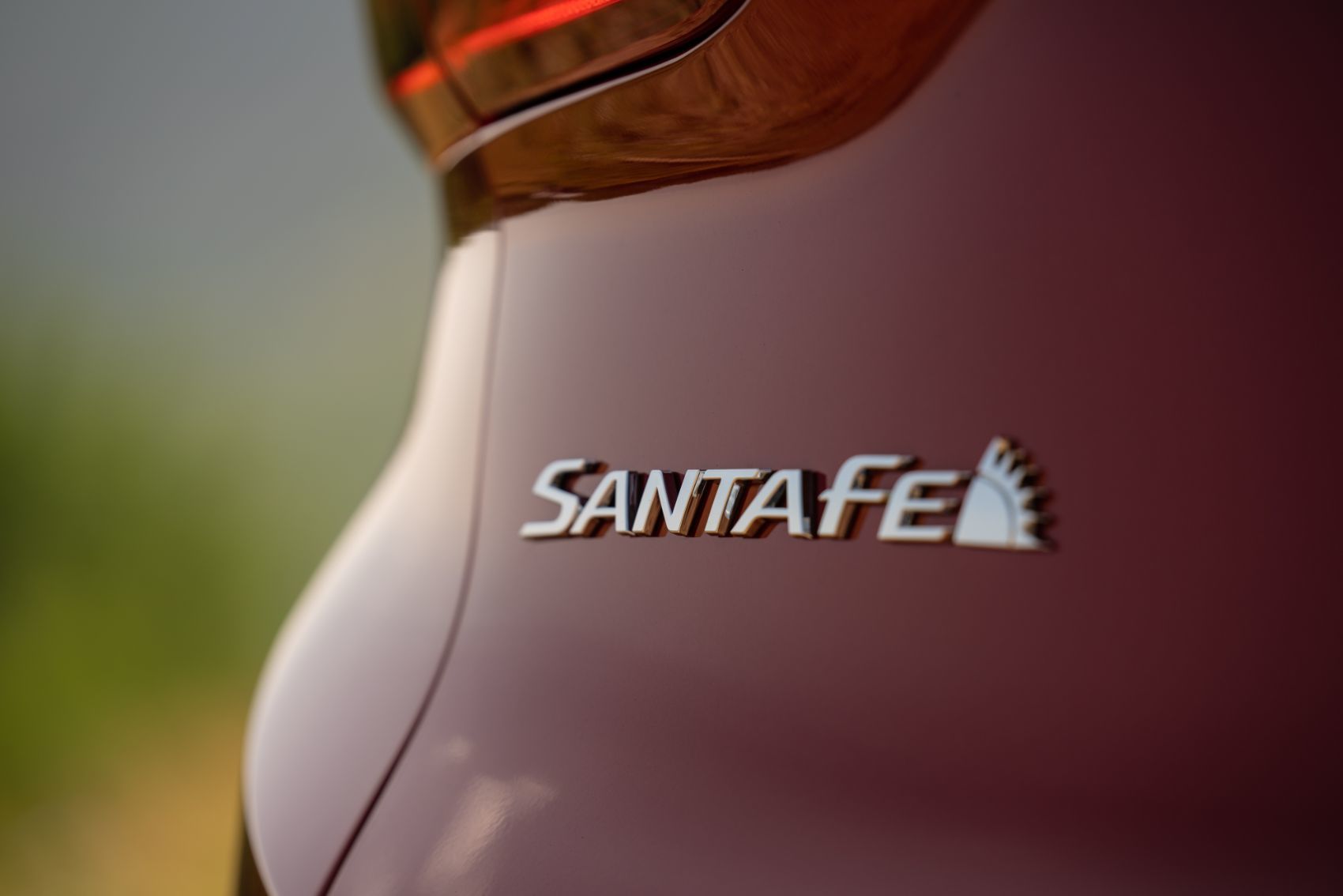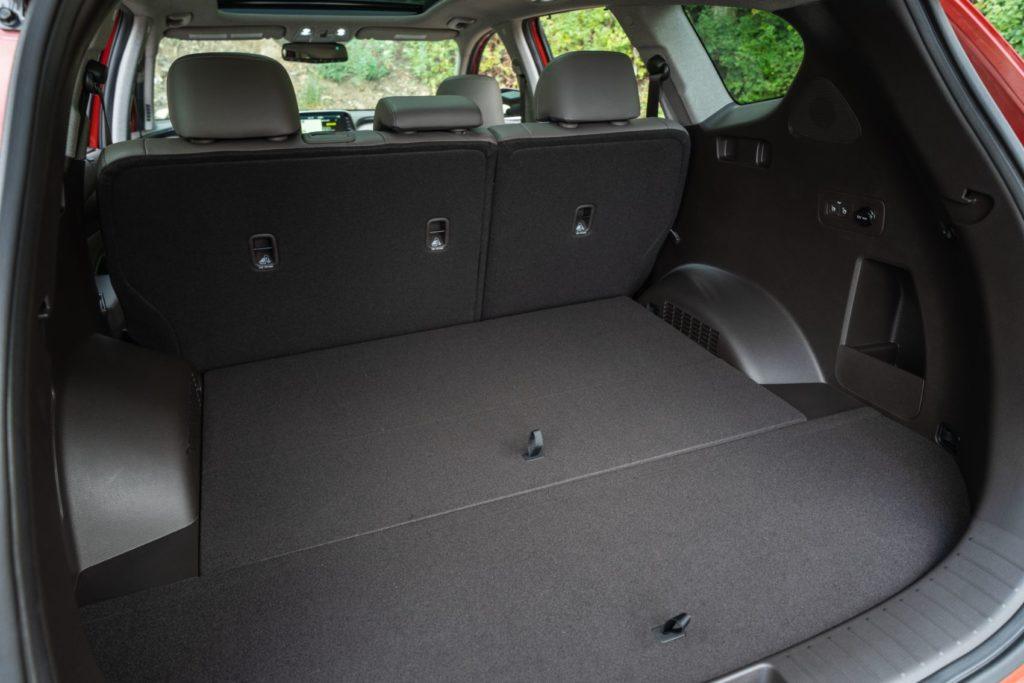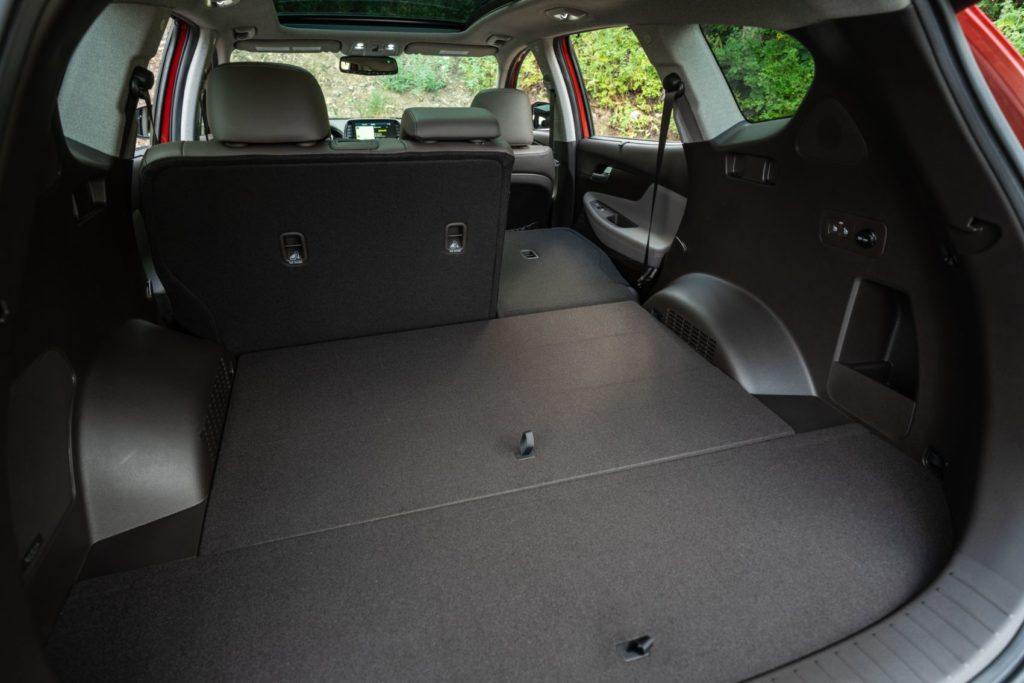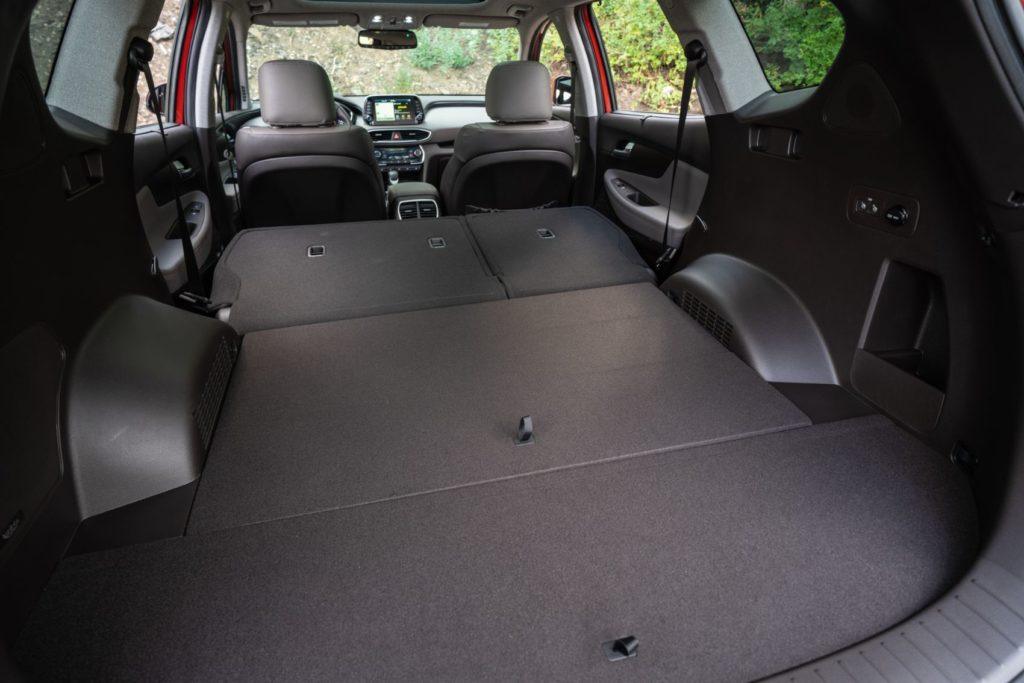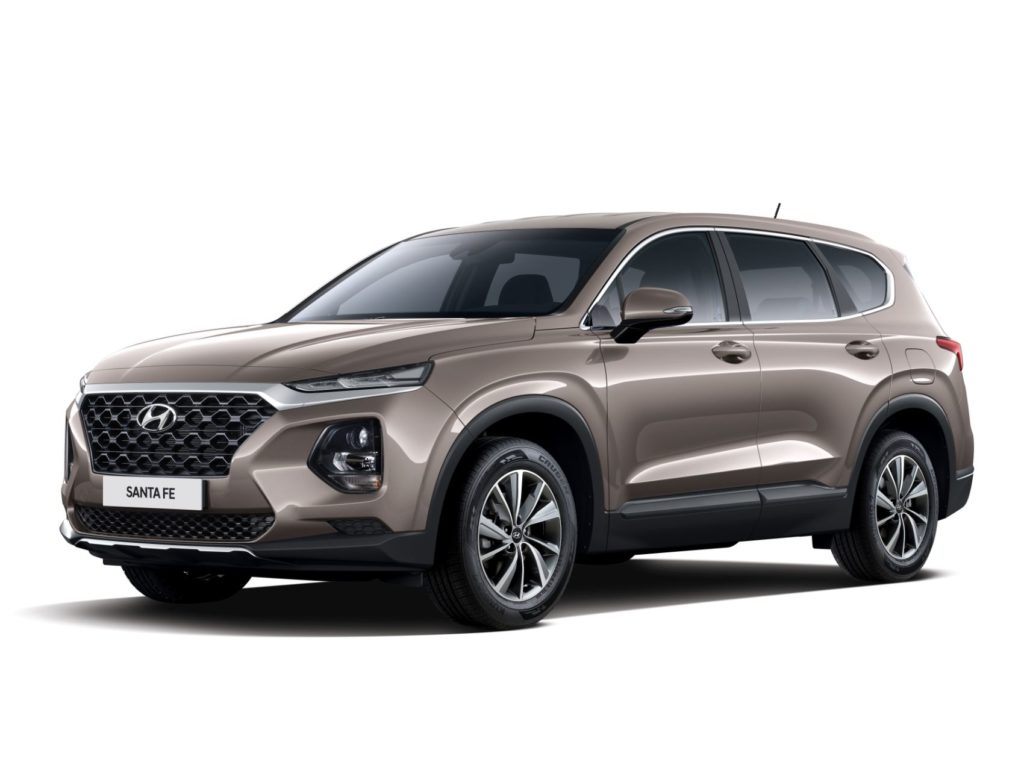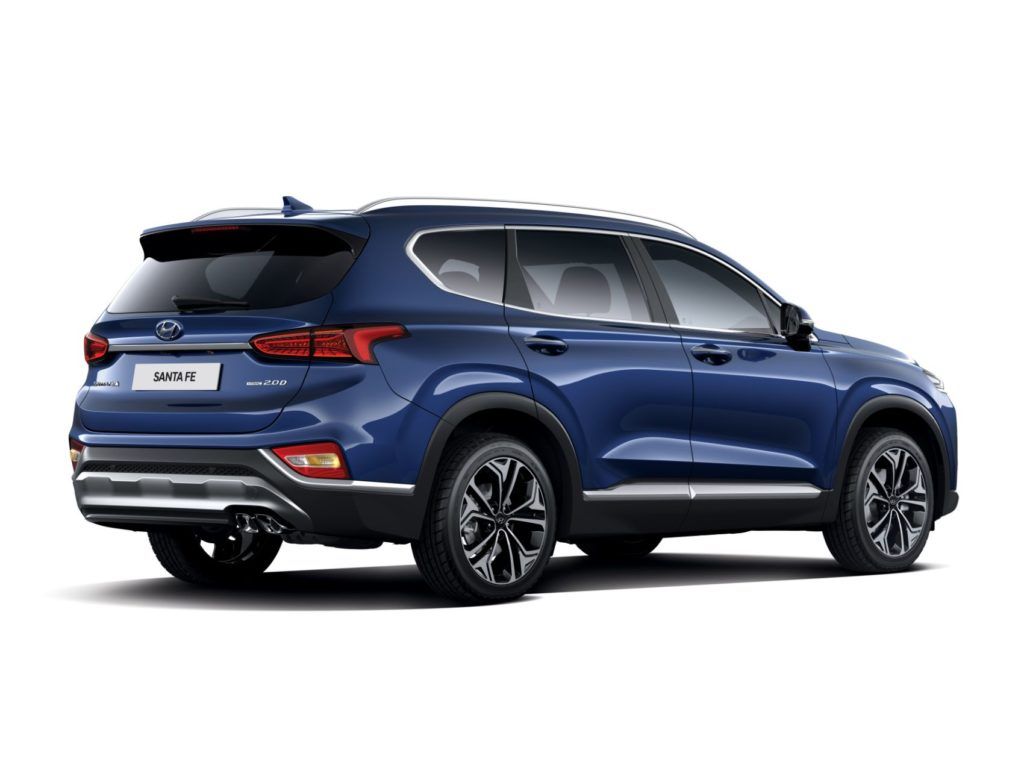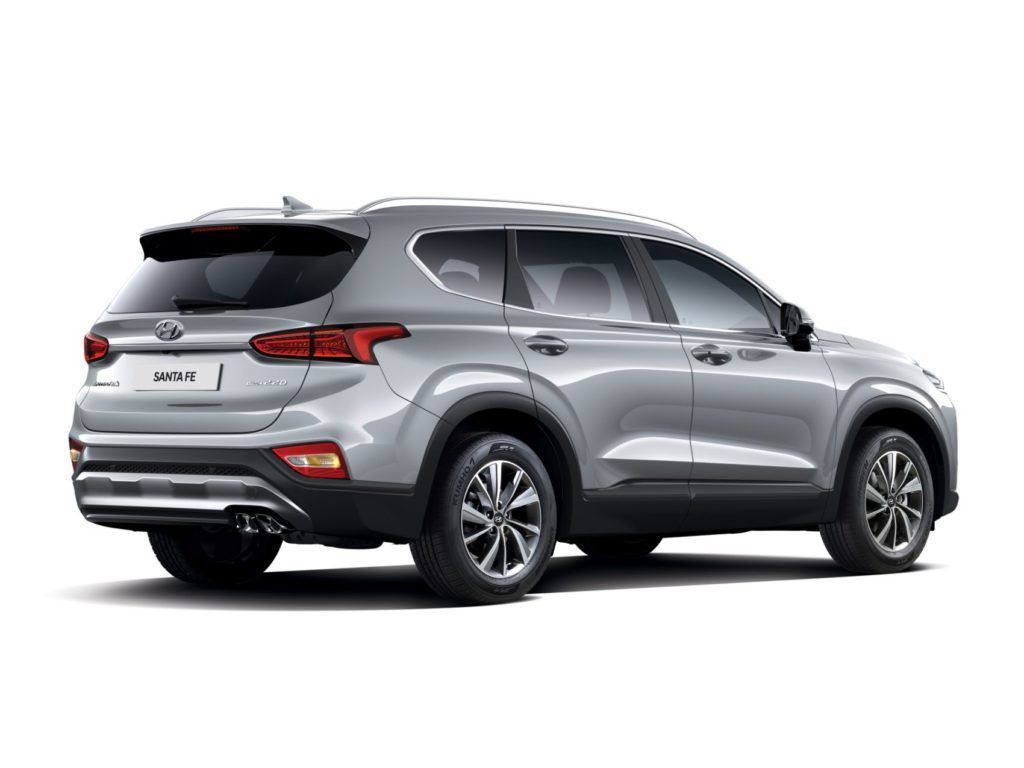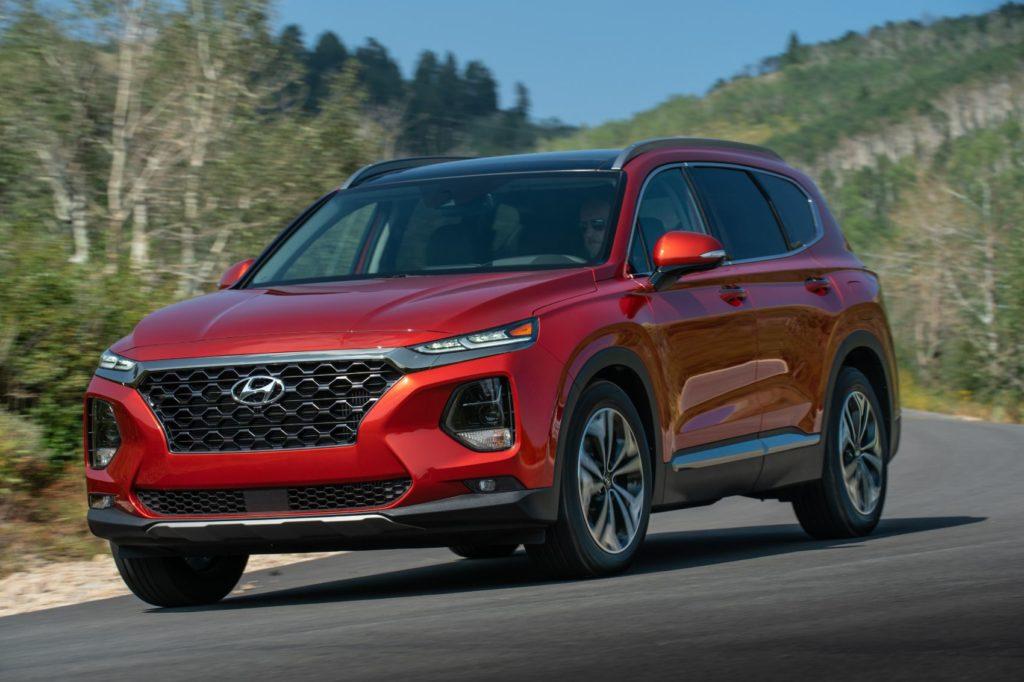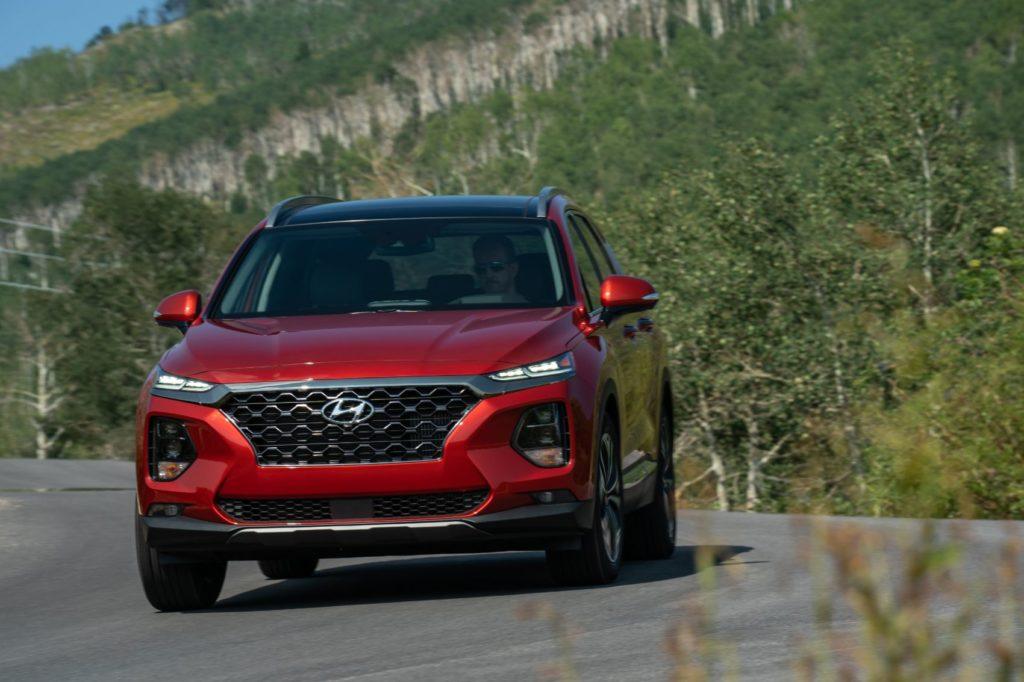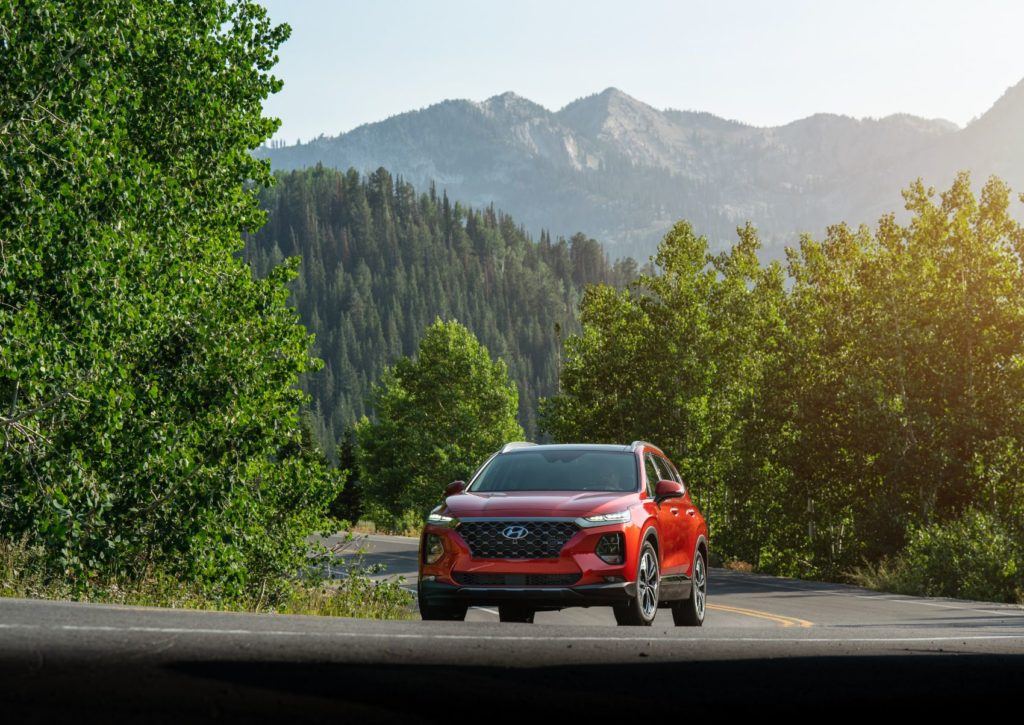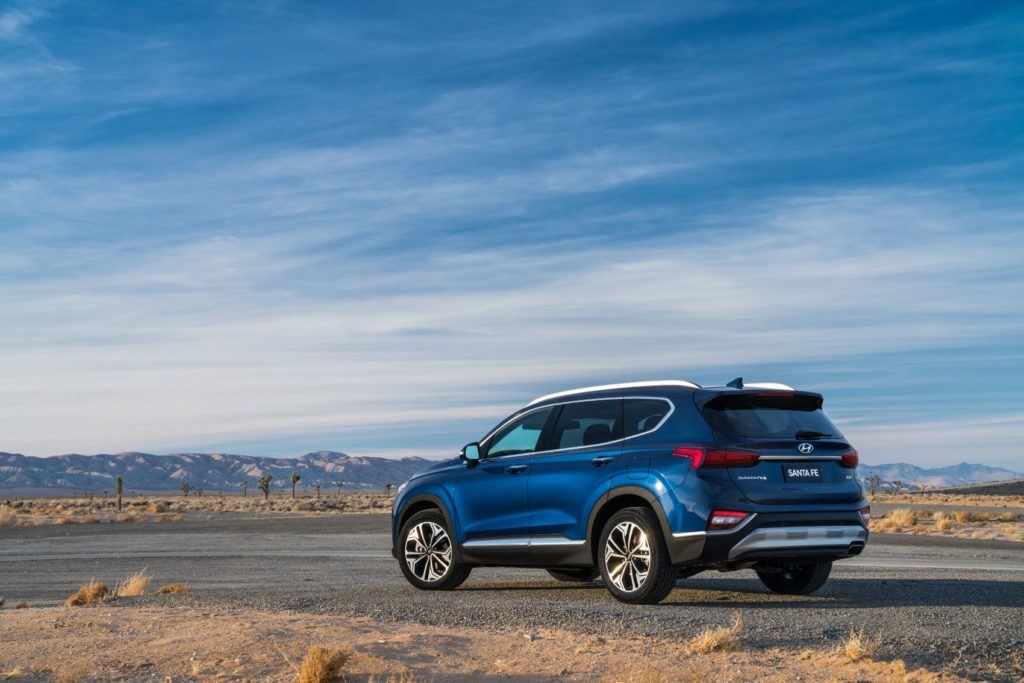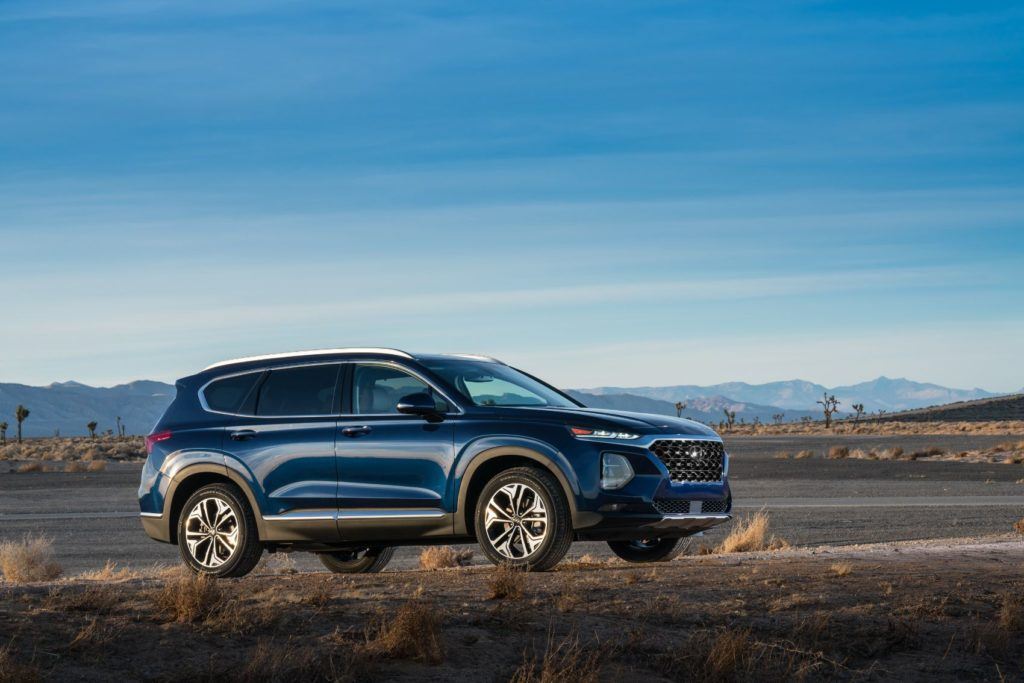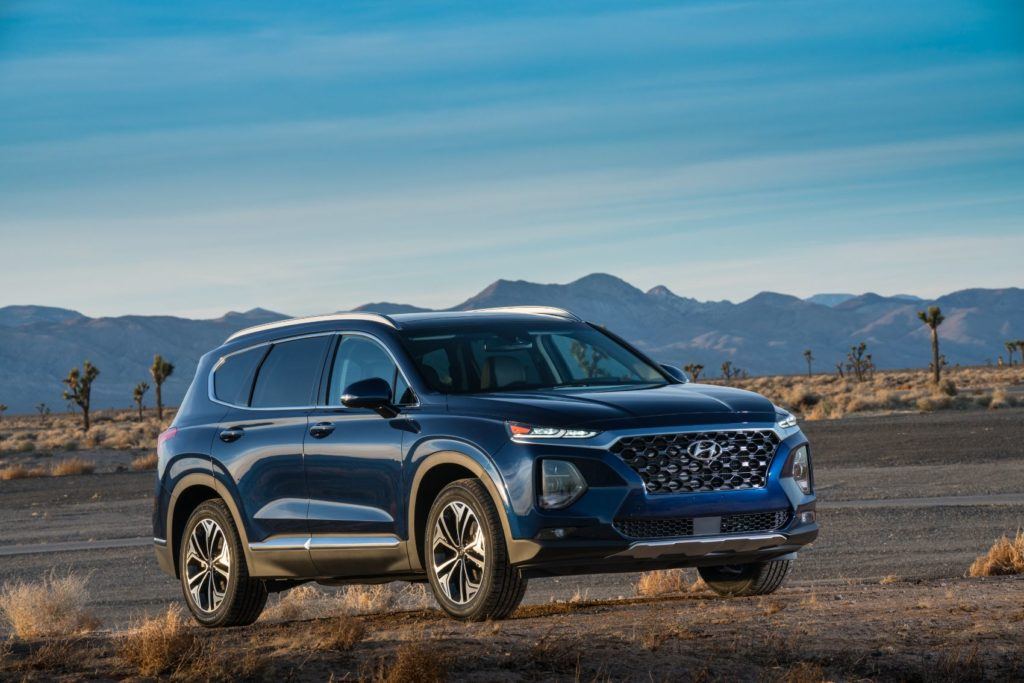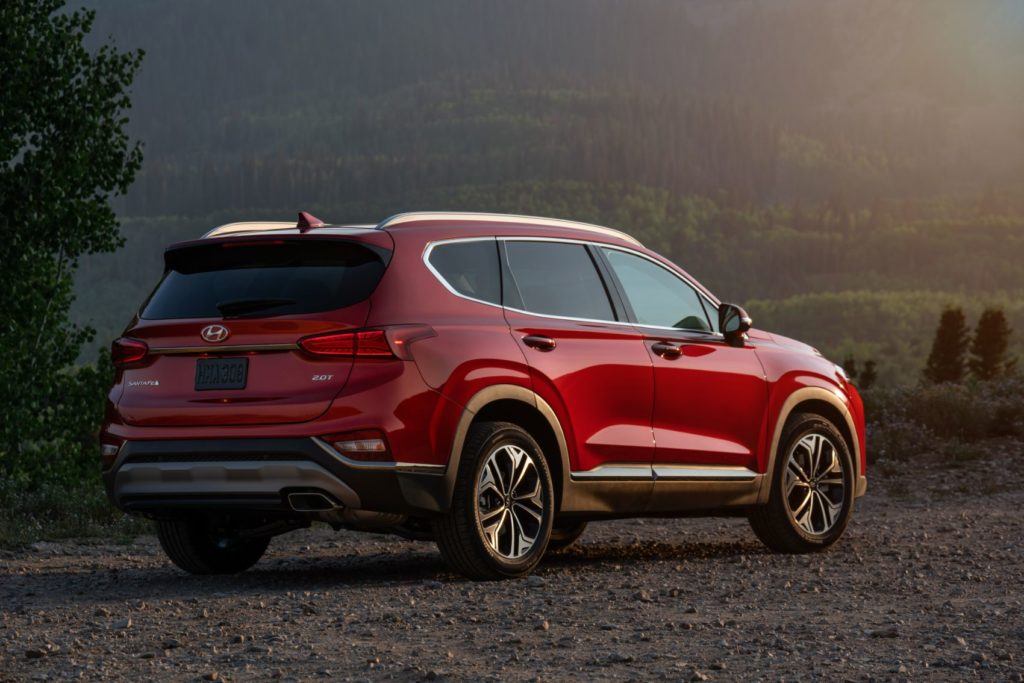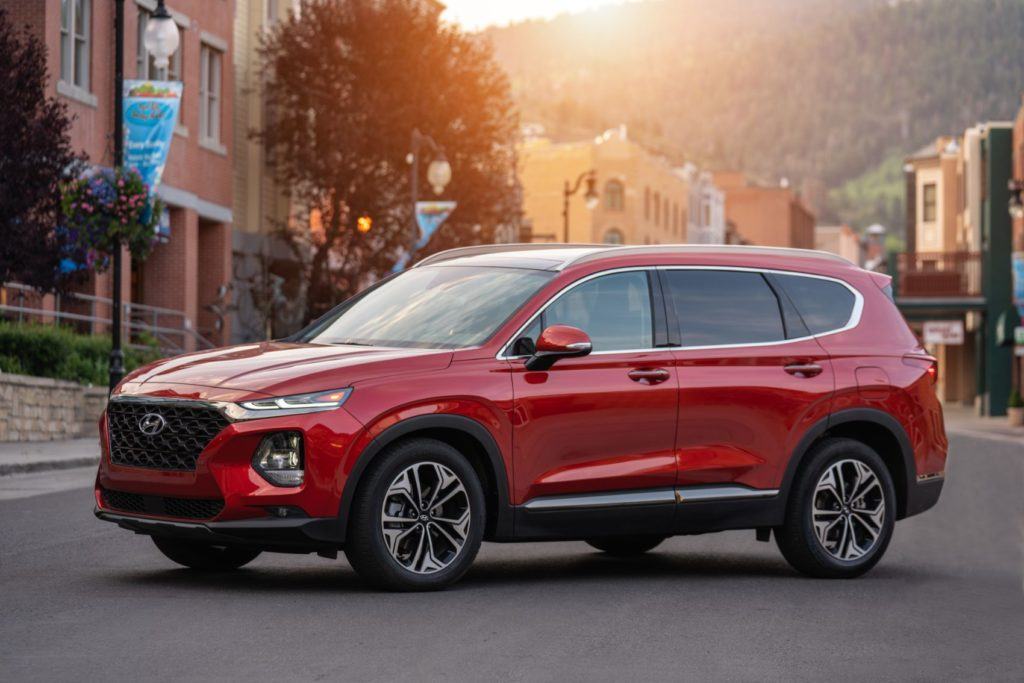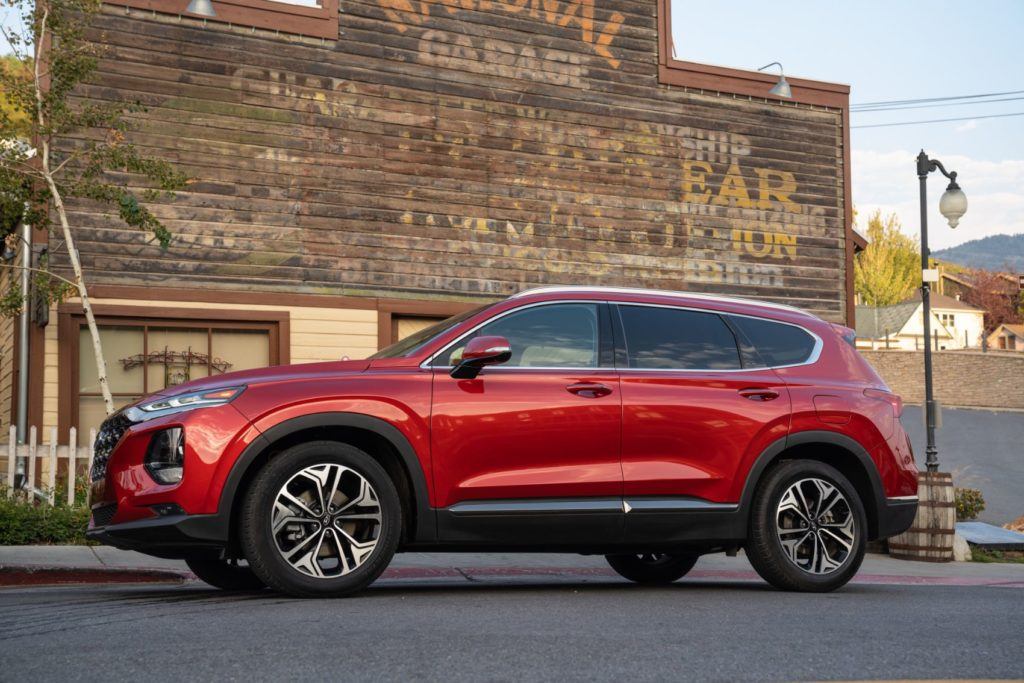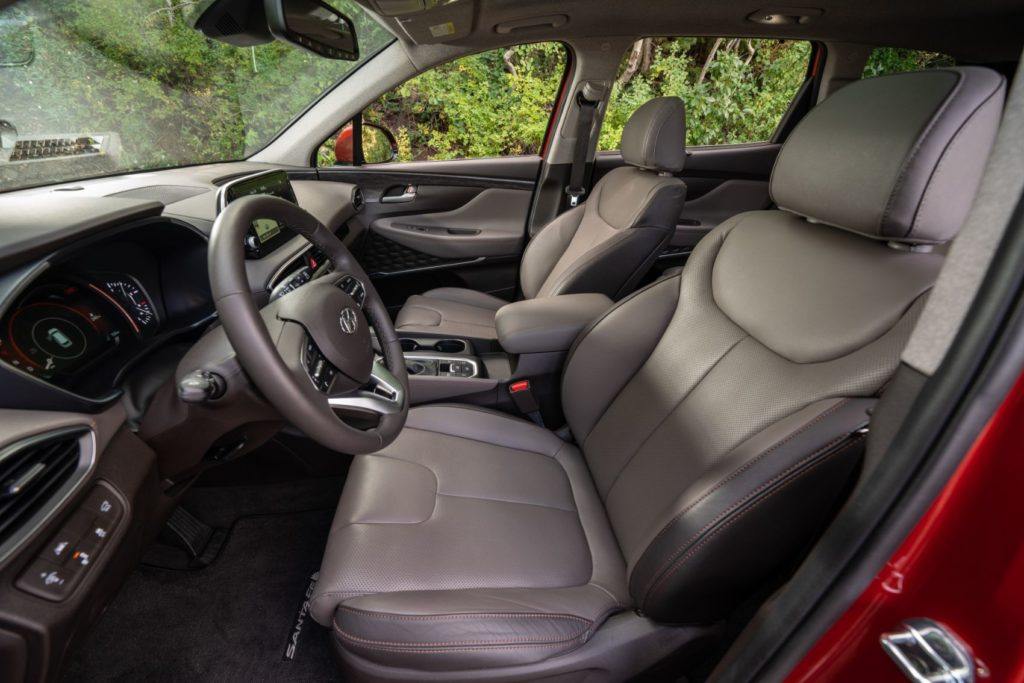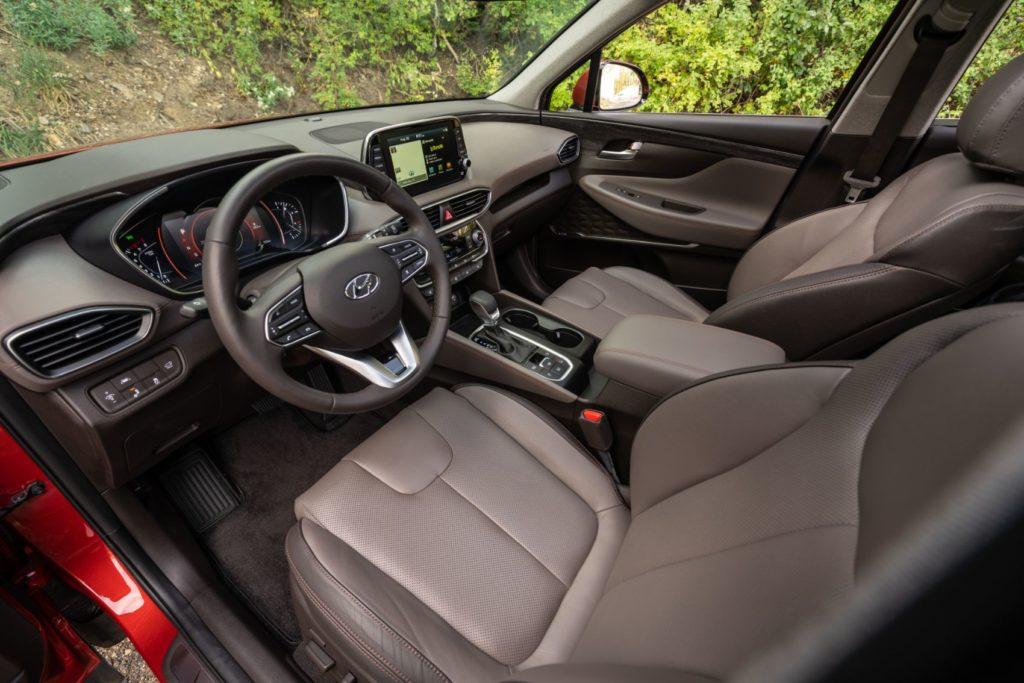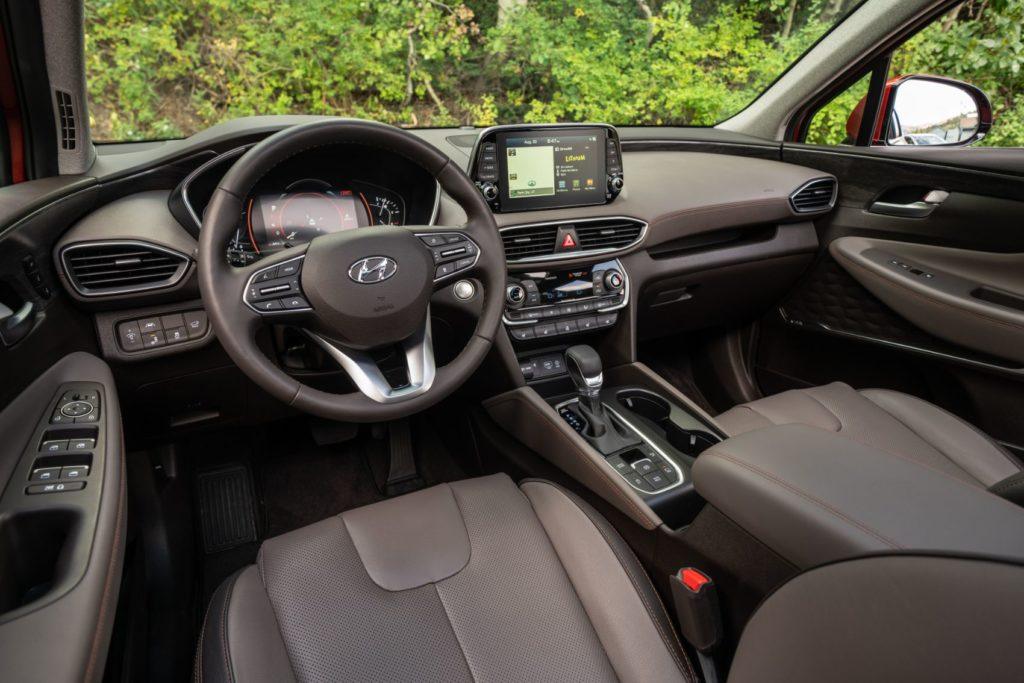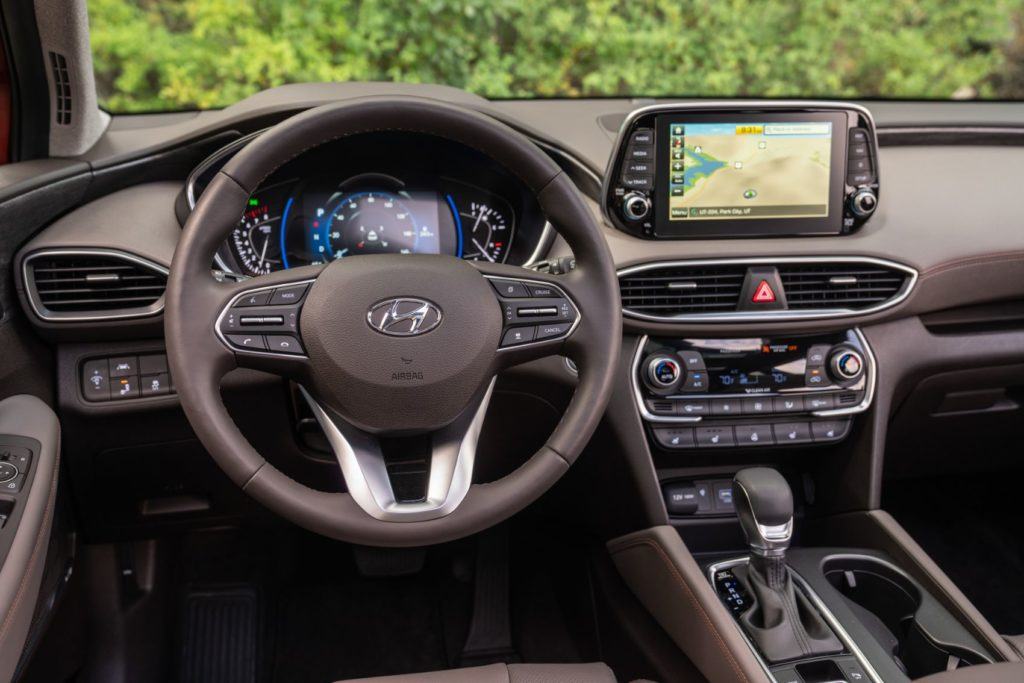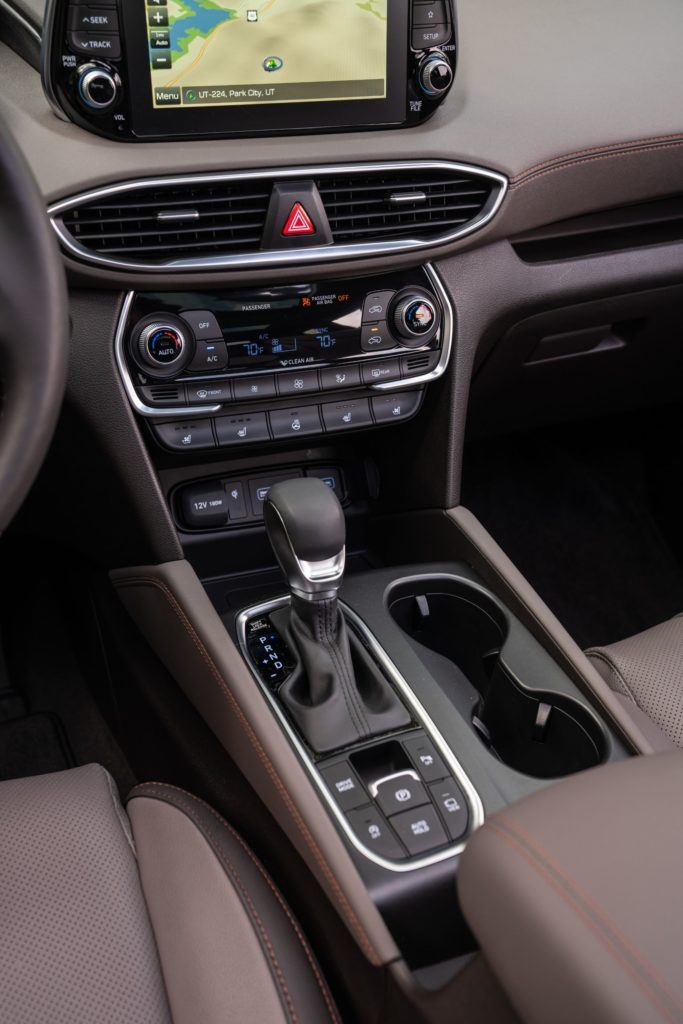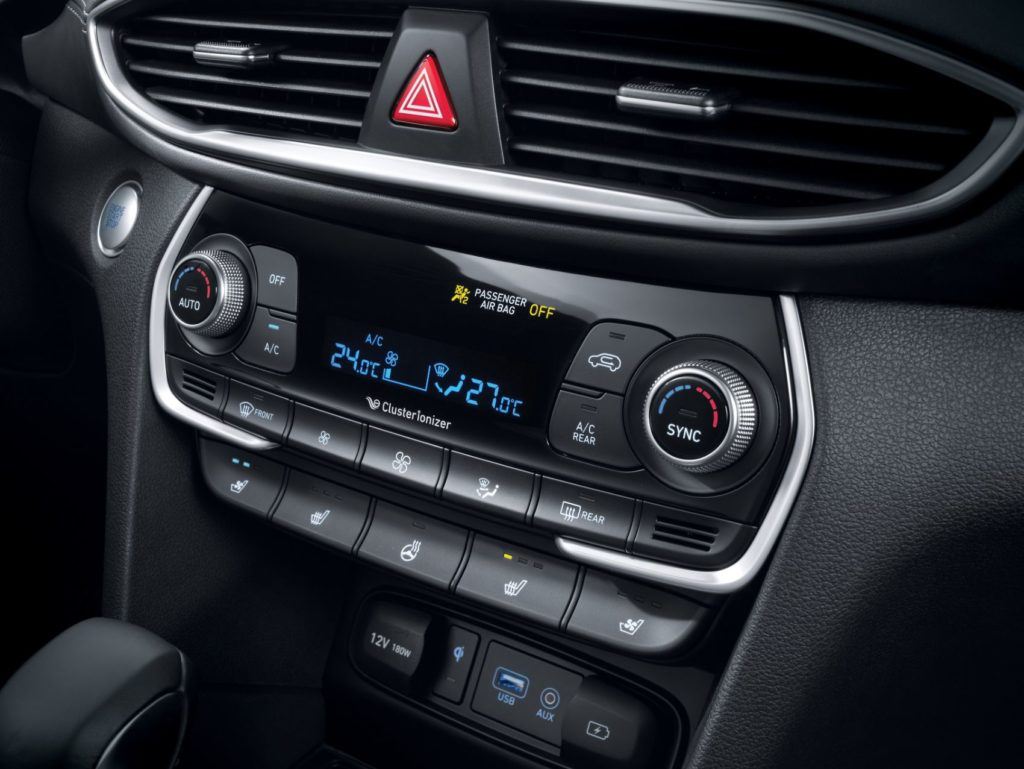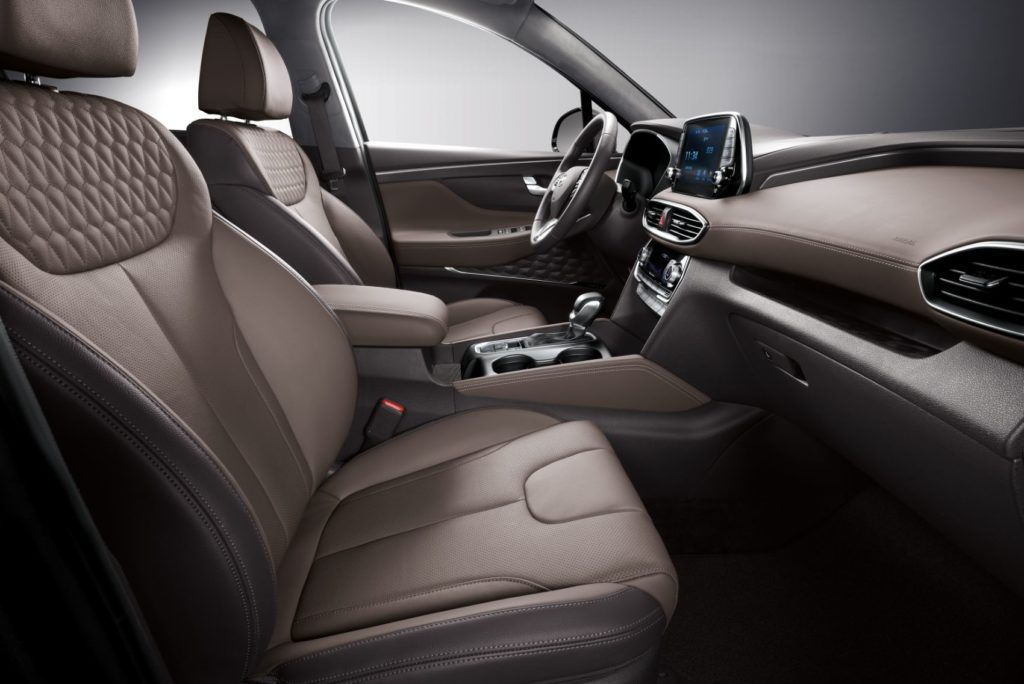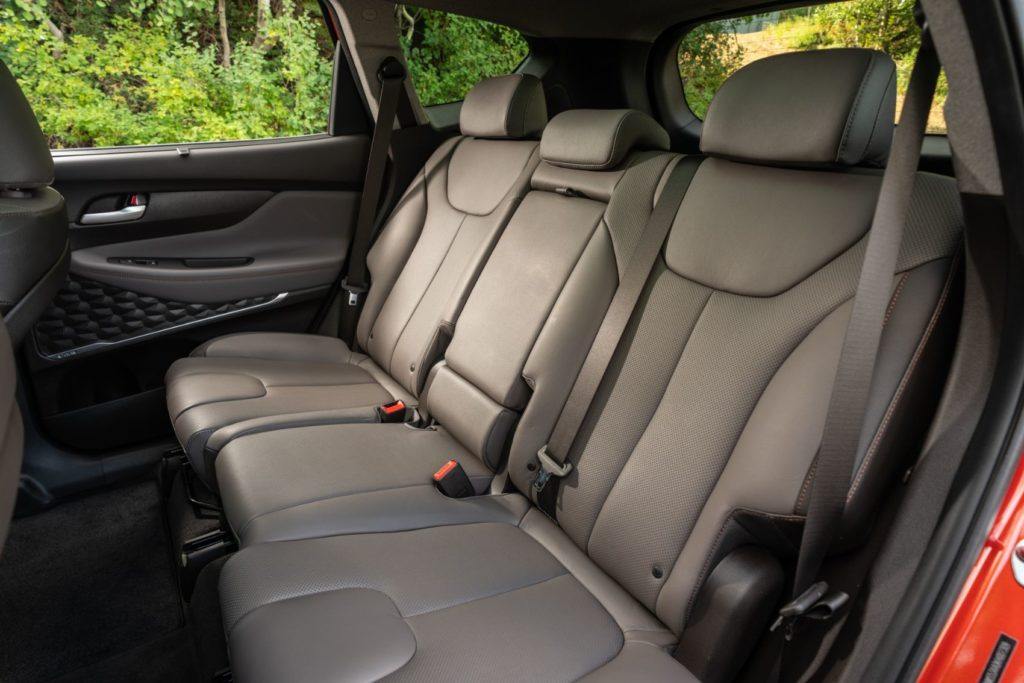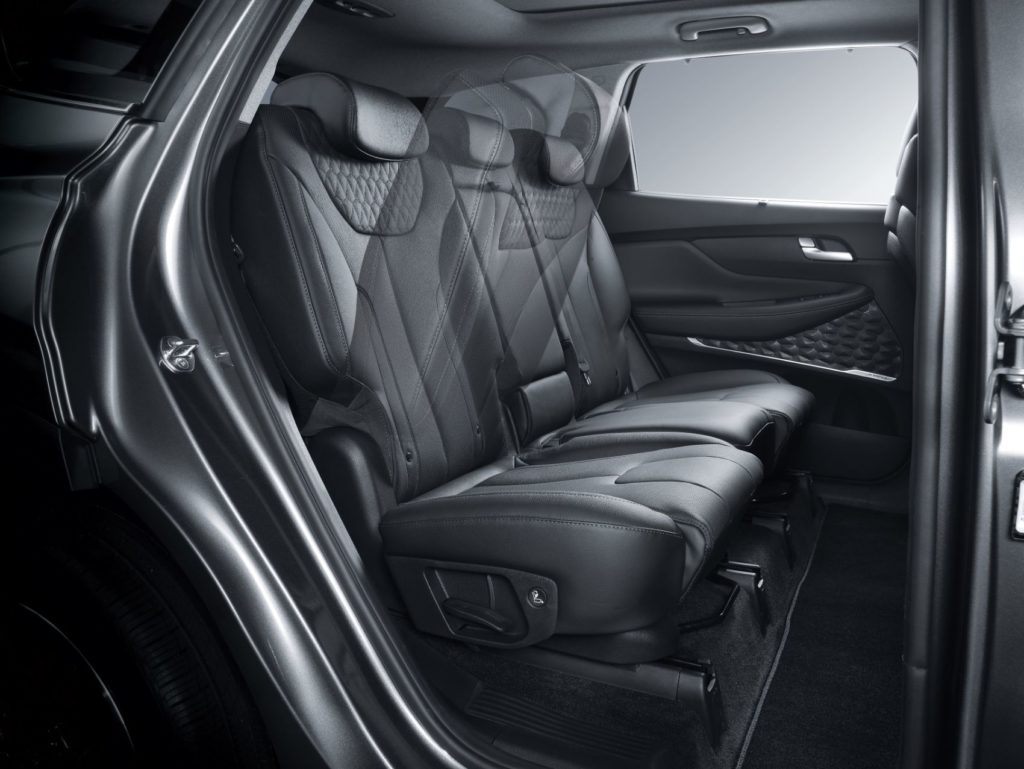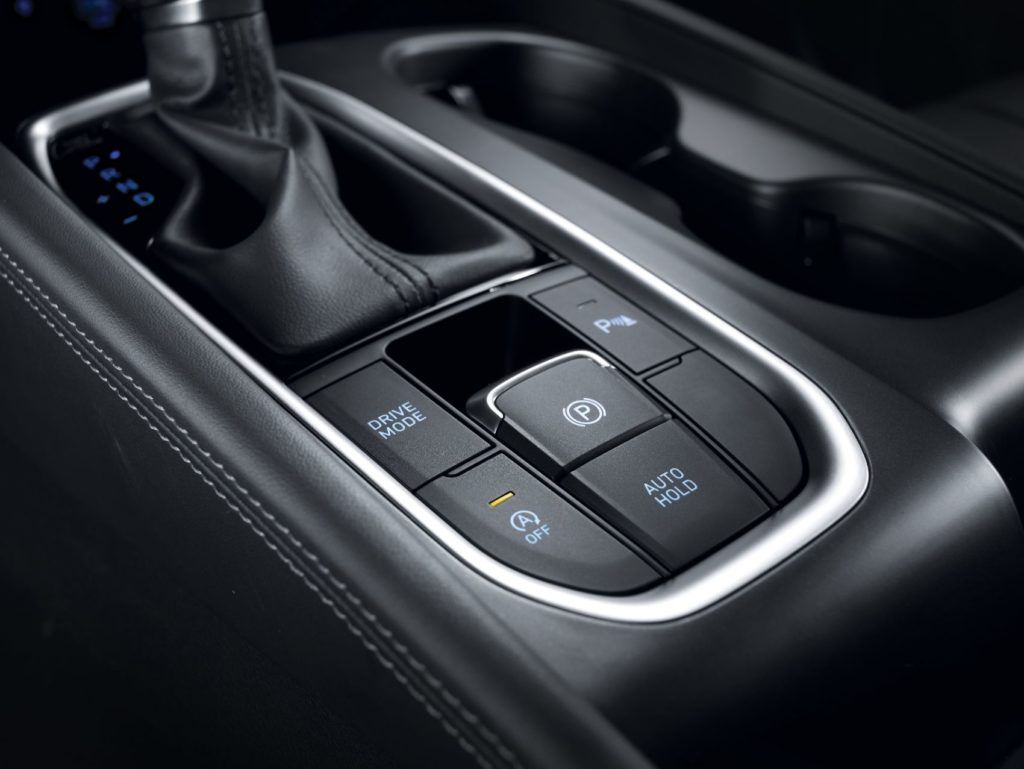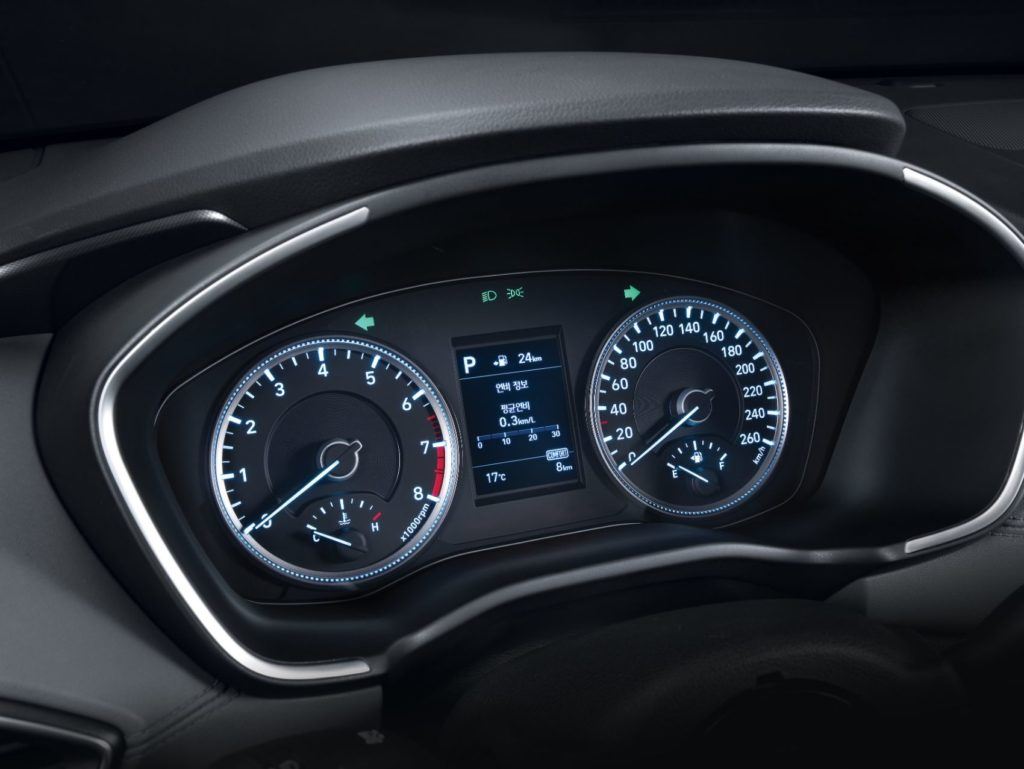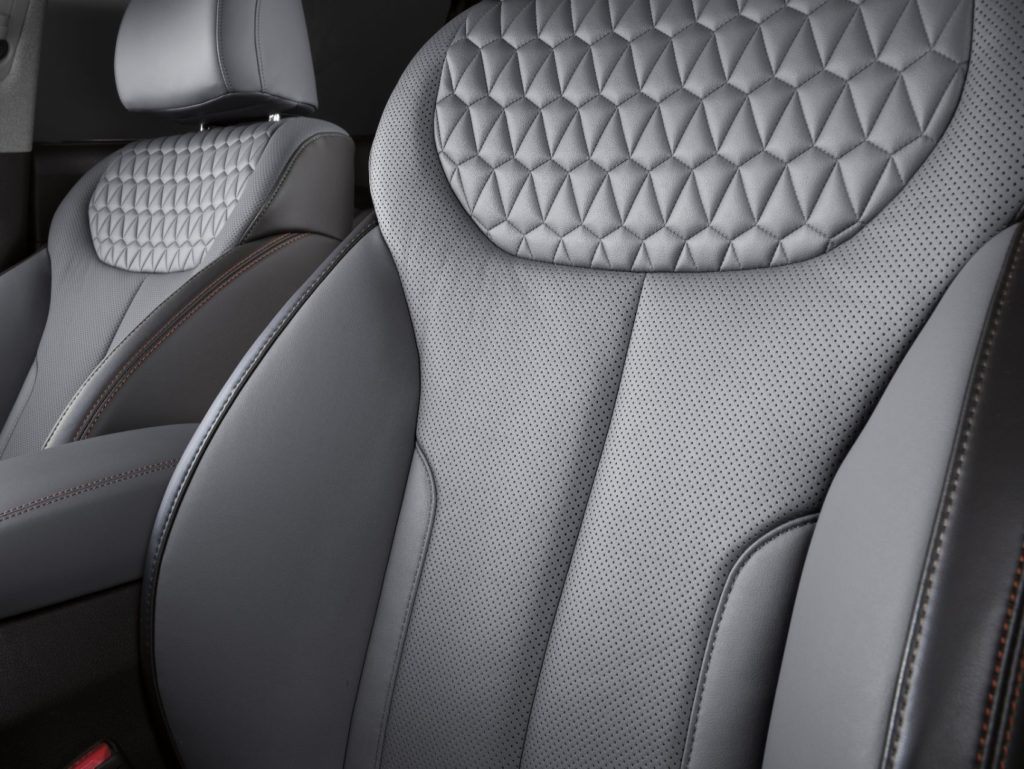The 2020 Hyundai Santa Fe is making a name for itself in a crowded market, and doing so quite handily. It has a solid history behind it, and strong rankings from publications like U.S. News & World Report. And current owners seem to absolutely love the Santa Fe.
We recently spent a week driving the 2020 Hyundai Santa Fe. Our press vehicle came with all-wheel drive and a 2.4-liter four-cylinder engine. During our drive, we paid close attention to things like ride and handling, fuel economy, interior comfort, and everyday functionality.
How did our experience with the two-row SUV compare to what others are saying? Here is what we found during our test drive.
Hyundai Santa Fe: What’s New For 2020?
Following an extensive redesign last year, the Santa Fe receives only minor upgrades for 2020. Premium door sill plates, dark chrome exterior trim, and a Blind-View Monitor are now standard on the Limited. Rear Occupant Alert is standard on SE and SEL, and wireless charging is now standard on the SEL w/Convenience and above.
Trim levels for the 2020 Hyunda Santa Fe include SE, SEL, SEL 2.0T, Limited, and Limited 2.0T.
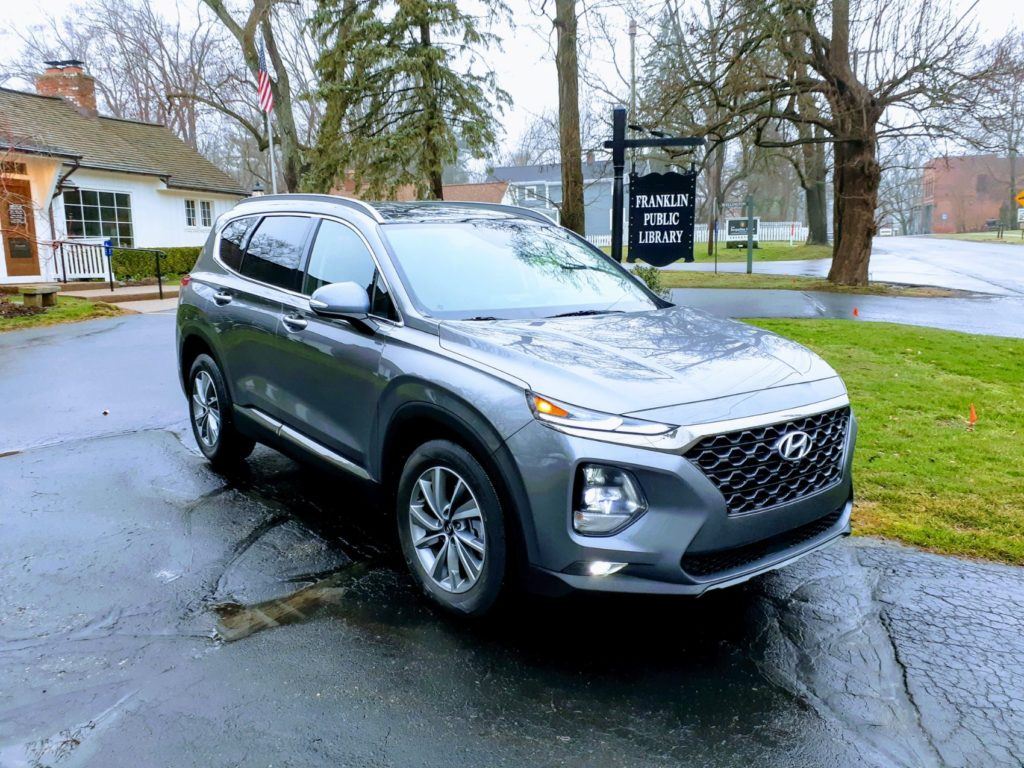
Our 2020 Hyundai Santa Fe Press Vehicle
Our Santa Fe Limited came standard with the Advanced Safety Technology package. That included Forward Collision-Avoidance Assist; Safe Exit Assist; High Beam Assist; Blind-Spot Collision-Avoidance Assist; Lane Keeping Assist; Surround View Monitor; and Smart Cruise Control, among other safety features.
The Comfort & Convenience package pampered us with heated and ventilated leather seats (with memory); leather-wrapped (and heated!) steering wheel; dual-zone climate control; wireless charging; heads-up display; push-button start; and rear sun shades.
This same package makes the 2020 Santa Fe a connectivity powerhouse. Our press vehicle came with an eight-inch navigation display; Bluetooth functionality; Android Auto and Apple CarPlay; SiriusXM radio; 12 volt power outlets; a 115 volt power outlet; and three years of Hyundai’s Blue Link services complimentary.
My favorite feature in the Comfort & Convenience package is the Quantum Logic Surround Sound stereo with Clari-Fi technology. I flipped to Watercolors (SiriusXM 66) as I often do and gave it a little volume. The warm, rich tones of contemporary jazz sound good rolling through the Santa Fe’s cabin.
What Does The 2020 Hyundai Santa Fe Cost?
Base price for our 2020 Hyundai Santa Fe Limited was $37,350. We had just one option in the carpeted floor mats ($135). The destination charge was another $1,095. Add it all up for a total MSRP of $38,580. By comparison, the 2020 Hyundai Santa Fe starts at $26,125 for the SE trim. The Limited 2.0T, at the top of the mountain, begins at $37,725.
The new Santa Fe is an affordable vehicle overall. However, depending on local incentives, you might be able to save a little more. This free and easy search tool* will show you which dealers near you are offering the best price.
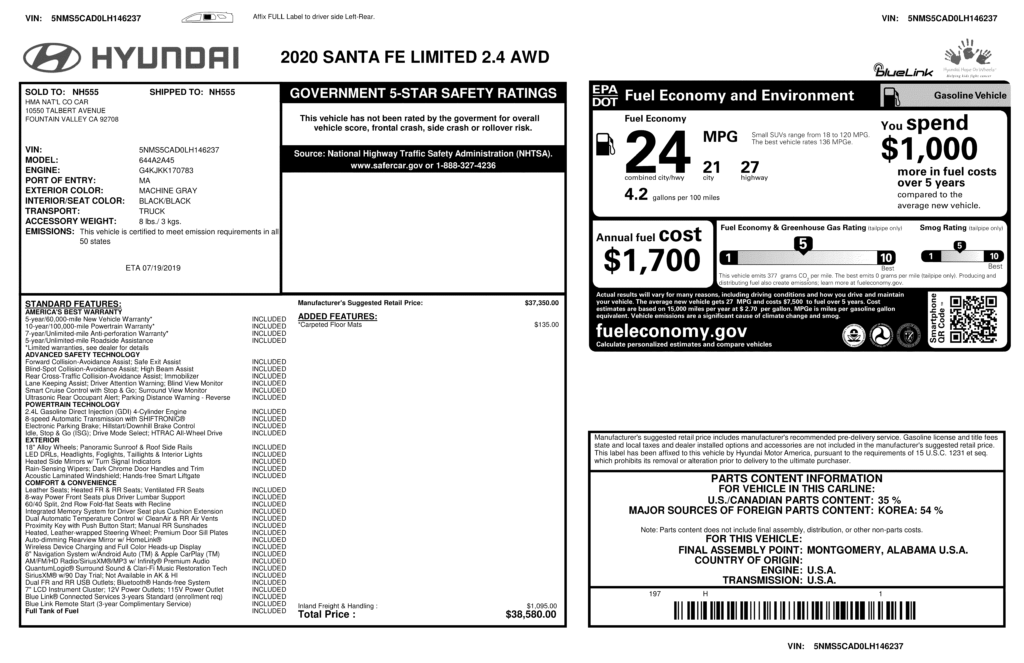
Interior Highlights: Initial Impressions
Although there are a few things here and there, it’s hard to find fault with the Santa Fe’s interior. At the lower portion of the center stack, the USB and auxiliary ports are readily accessible. Just above is a row of buttons for the heated and ventilated seats (driver and passenger), with the heated steering wheel button right in the middle.
Rear passengers have access to their own charge ports as well.
The eight-inch center display is responsive, intuitive, and colorful, but it appears jammed into the top of the dash haphazardly. We noticed this in the G70 recently as well. Hyundai has a sharp interior here, but the touchscreen seems like an afterthought, as if they didn’t know where to put it. While it is tilted specifically to reduce glare (and it does accomplish that), the touchscreen reminds us of an aftermarket navigation unit that was attached to the dash last-minute.
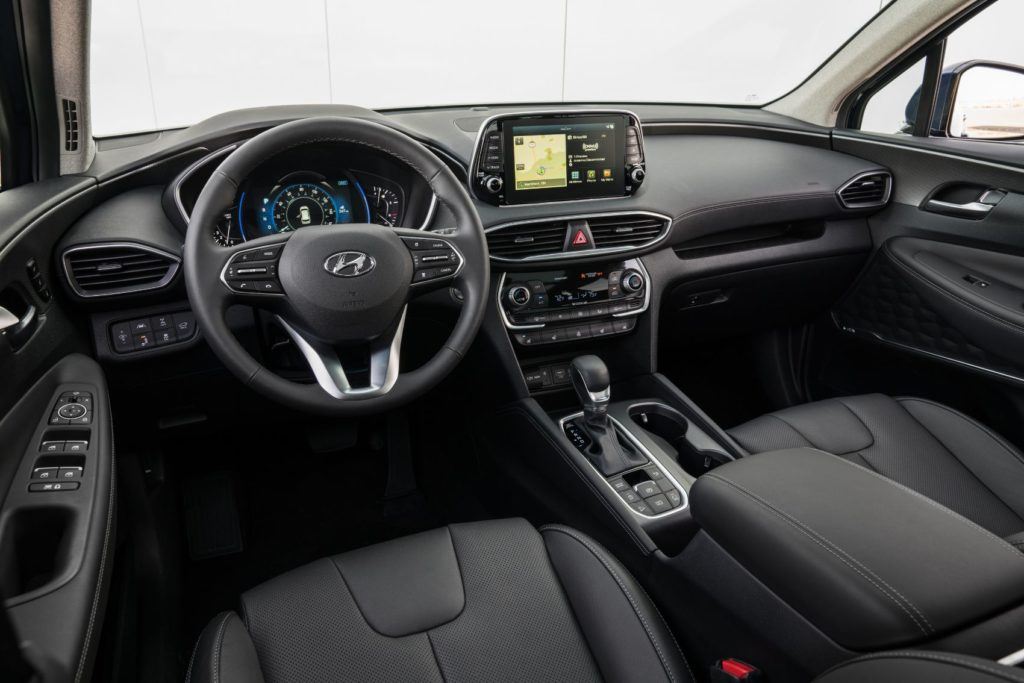
Interior Highlights: Load Up
The second row can accommodate three individuals if necessary, and two rather easily. If you have teenage boys that shot up overnight, they can make use of the reclining rear seats. For the family member that likes to nap on every trip, they will enjoy the rear sunshades.
The Santa Fe’s 60/40 split second row means you have some flexibility when transporting passengers and cargo simultaneously. Behind the second row is 35.9 cubic feet cargo space, extending to 71.3 cubic feet when folded. While not a deal-breaker, that’s less than the 2020 Honda CR-V on both fronts. The CR-V offers 3.3 inches more behind the second row, and 4.5 inches with the second row folded.
Total interior volume for the Santa Fe is 146.6 cubic feet.
Interior Highlights: Safe & Secure
Those with an active family will likely appreciate two key features: Rear Occupant Alert and Safe Exit Assist. The first will notify drivers if a person or animal is present in the rear seat as they leave the vehicle. The latter uses radar to detect a vehicle approaching from behind, alerting you to its presence if your kids open the door and don’t see that vehicle.
Safe Exit Assist is a feature worth its weight in gold, especially if you have little ones riding along each day. The generous amount of standard safety features – and Safe Exit Assist in particular – make the 2020 Hyundai Santa Fe a good pick for families. It only takes one time to realize what a blessing that feature is.
- Related: A brief history of the safety features in your car.
2020 Hyundai Santa Fe: Engine & Powertrain
Under the hood of our press vehicle was a naturally-aspirated, 2.4-liter inline four-cylinder with 185 horsepower (6,000 rpm) and 178 lb-ft. of torque (4,000 rpm). It’s a chatty engine and makes quite a bit of noise on acceleration. Personally, it didn’t bother me so much but our passengers were put off. I could see how some might get annoyed, as it does seem like the engine is struggling at times.
On the highway, however, things are fairly quiet.
Buyers can opt for a more powerful 2.0-liter turbo engine with 235 horsepower (6,000 rpm) and 260 lb-ft. of torque (1,450 – 3,500 rpm). Both engines are connected to an eight-speed automatic. For the most part on our drive, the shifts were seamless minus a few hard ones every now and again when accelerating.
- Related: What does a Hyundai warranty really cover?
Is The 2020 Hyundai Santa Fe All-Wheel Drive?
All-wheel drive is available for the 2020 Hyundai Santa Fe, and our press vehicle was equipped with it. The system, known as “HTRAC,” actively balances torque between the front and rear axles depending on the driving conditions at hand. There are three different drive modes for HTRAC: Normal, Sport, and Smart (which is like an Eco mode).
Gas Mileage of The 2020 Hyundai Santa Fe
The blue italics in the above chart denote the engine and drivetrain of our 2020 Hyundai Santa Fe press vehicle.
Before departing for our customary Saturday evening drive, we reset the trip odometer. We traveled just over 60 miles around the Detroit metro, a mixture of city and highway driving. Some of it was slower going, like looking at houses for sale in the area, while part of it was spent cruising at higher speeds on M-10 through the city.
After just shy of two and a half hours, we averaged 25.1 mpg combined, more than what is listed on the window sticker.
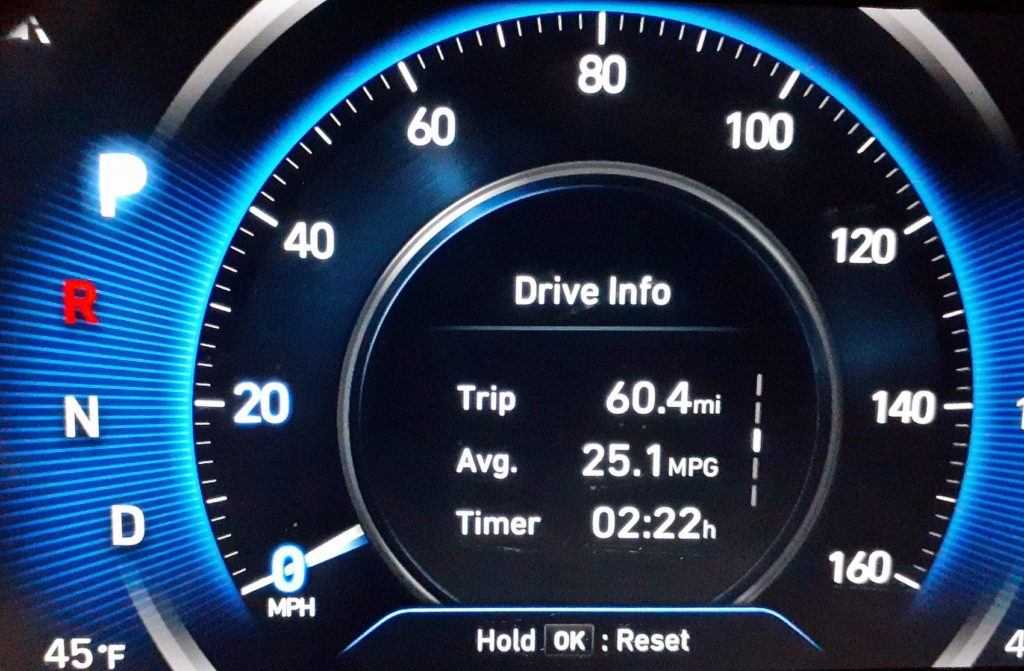
How Does The 2020 Hyundai Santa Fe Drive?
The Santa Fe feels stable and composed, especially at higher speeds. As we cruised down M-10 and back to the Detroit metro, the whole of the Santa Fe felt comfortable and smooth. We had the heated seats and steering wheel on, and there was little to no wind or road noise to interrupt our conversation. Suffice it to say, the 2020 Santa Fe would handle a longer trip just fine.
I had occasion earlier this year to drive the smaller Venue and the larger Palisade. While each are nice in their own way, the Santa Fe feels more refined than both. The advanced safety features, like lane-keeping assist, blind-spot detection, and adaptive cruise control, are more intuitive on the Santa Fe and did not register any false positives for us.
While the Venue can sometimes feel too small, and the Palisade too large, the Santa Fe is a nice middle ground. The Santa Fe sits a little higher than the Venue, but is easier to maneuver than the Palisade. The Palisade can have a “boat-like” feeling on the highway, especially if a random gust of wind comes up. There is less of that rocking and weaving in the Santa Fe, but it’s still more muscular than the Venue.
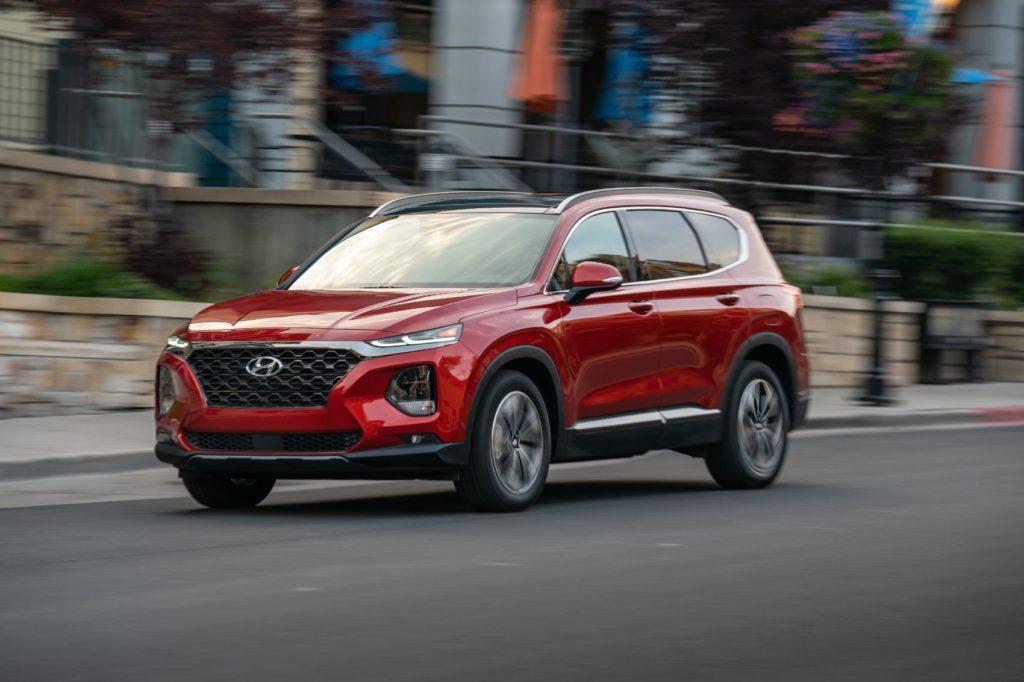
Should You Buy a 2020 Hyundai Santa Fe?
As always, we recommend doing your research as there are a vast number of SUVs on the market. The toughest competition for the Santa Fe, in our view, would be the Honda CR-V and the Mazda CX-5. If you are just beginning your search, maybe start with those three and go from there.
Should you come back to the 2020 Hyundai Santa Fe, we don’t think you would be disappointed. It’s comfortable on the open road, has a nice array of safety and tech features, and is competitive in terms of price and cost of ownership.
Carl Anthony is Managing Editor of Automoblog and a member of the Midwest Automotive Media Association and the Society of Automotive Historians. He serves on the board of directors for the Ally Jolie Baldwin Foundation, is a past president of Detroit Working Writers, and a loyal Detroit Lions fan.
2020 Hyundai Santa Fe Gallery
Photos: Hyundai Motor America.
*Automoblog and its partners may be compensated when you visit this link.

